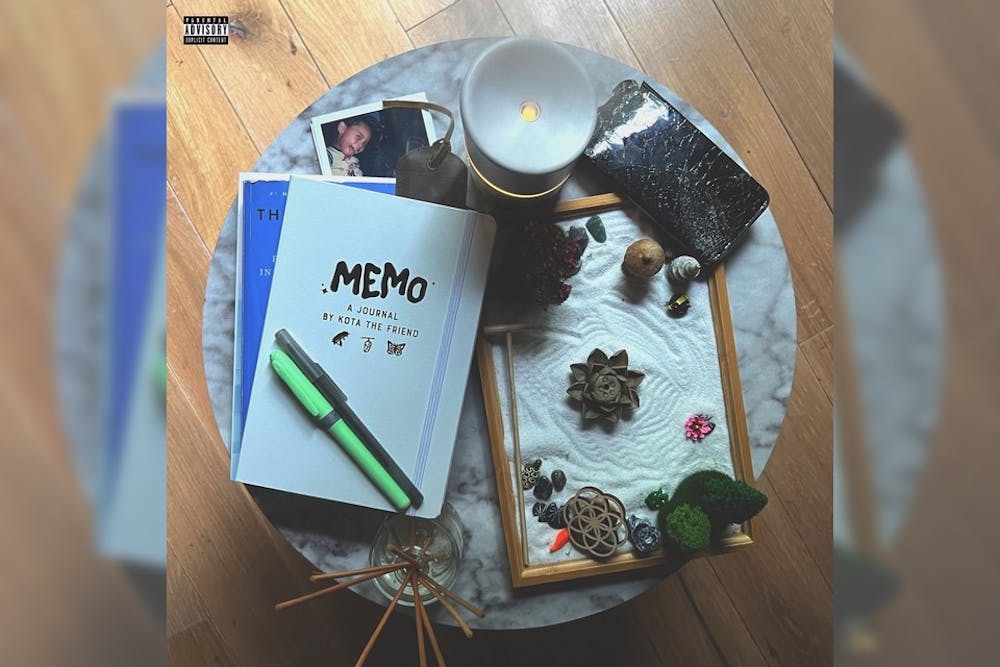Although Kota the Friend released his first studio album in 2018, “MEMO,” which came out on July 8, is his eighth to be published under his independent label, FLTBYS. It continues an incredibly prolific few years for Kota, who has consistently put out two albums annually since 2020.
From a musical perspective, “MEMO” is noticeably reminiscent of Kota’s previous work, but as a long-form artistic piece, it represents significant progress. It feels familiar, featuring the rapper’s signature neo-soul and jazz-inspired beats, but the progression of the album feels much more intentionally designed. It’s certainly best listened to in order.
The first track, “365 DAYS OF PEACE,” serves as an introduction to the album while also standing strongly on its own, shouting out different worldly communities and calling for peace. The song opens with a piano-driven beat playing softly behind a spoken voice, which we assume is speaking to Kota. He revealed on Twitter that the voice is that of his uncle, Richard Parker, and that it’s meant to represent home.
Kota’s mastery of contour is immediately evident in this first song. The beat is driven primarily by a simple but compelling two-bar loop of neo-soul piano chords, building and adding instruments as the song progresses.
It’s easy for this type of beat to become stale or repetitive, but Kota’s choices to drop and add instruments throughout the song keep it from reaching that point. This textural variation keeps the song interesting and unpredictable without pushing the listener away.
The next two tunes follow a similar formula, building a varied soundscape around a central, repeated harmonic phrase: in “JUMPMAN,” a staccato string quartet, and in “UP,” a church-like organ line.
The fourth track is the first of a number of interludes dispersed across the album, titled “MOMMA T’S INTERLUDE.” It features a scratchy voice telling the story of Kota’s mother running down a purse thief while soft ukulele chords play in the background.
Three such interludes appear on “MEMO.” The third, “DAD’S INTERLUDE,” is similar to the first, with the same voice telling of Kota’s father’s hustles as a young man over a dulcet electric piano. The second, however, is a mostly-fleshed-out song entitled “AVERY’S INTERLUDE” featuring Kota rapping over a repeated neo-soul guitar line.
While his other songs introduce other sounds over their central loop, “AVERY’S INTERLUDE” doesn’t, only containing the guitar and vocal. It becomes somewhat repetitive because of this but, as a brief interlude, it doesn’t feel obstructive.
The album’s penultimate track, “GOOD FRIDAY,” showcases the most sonic variation of any on “MEMO.” This song’s main loop is an eight-bar set of piano chords that, rather than repeating mechanically, sounds like it’s been played all the way through, with small variations from repetition to repetition.
At their introduction, these chords sound somber or morose, but the addition of a New Orleans style snare and a trap backbeat changes their tone entirely, making the song appear more optimistic, a change which is reflected in the lyrics. Even with this shift to a more upbeat tone, though, the song remains rather subdued, with Kota’s uncle’s voice entering again at the end.
Fans of Kota the Friend’s other work will be neither surprised nor disappointed with “MEMO.” For the most part, it’s more of what people love about Kota’s music: intriguing beats, diverse textures, and impressive lyricism. Beyond this, though, the interludes and spoken sections bring the whole thing together as not just a collection of songs, but an album.




